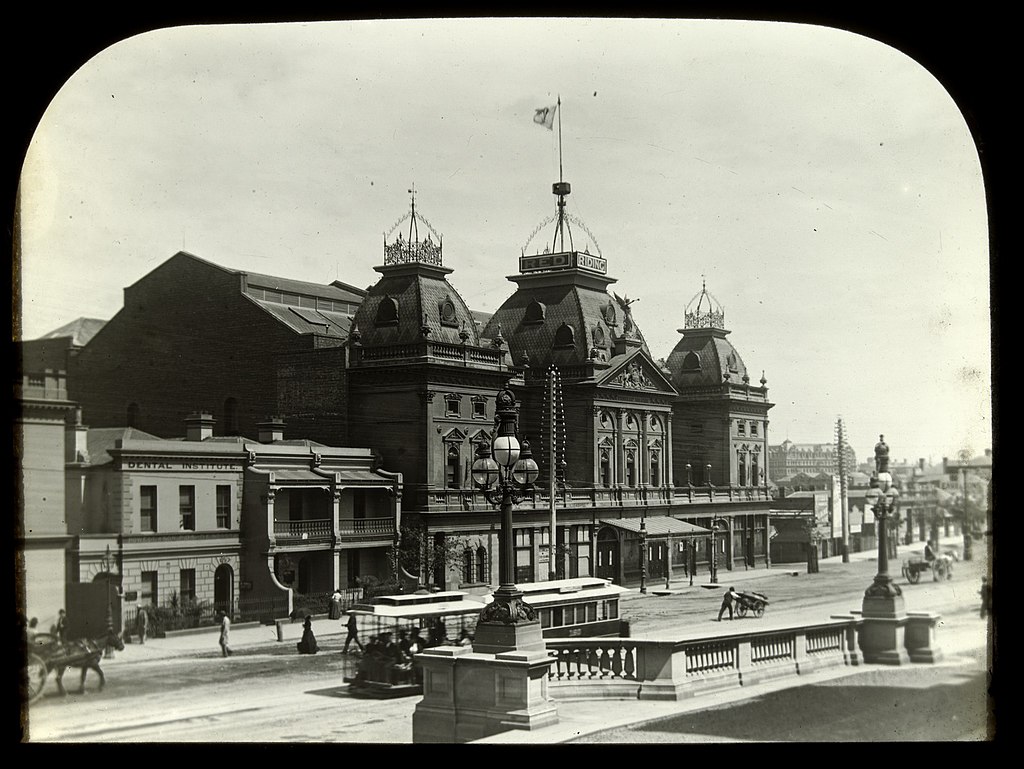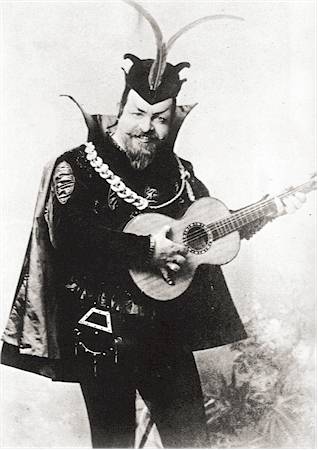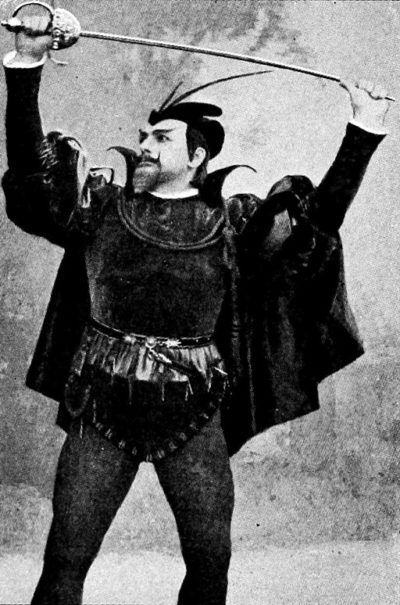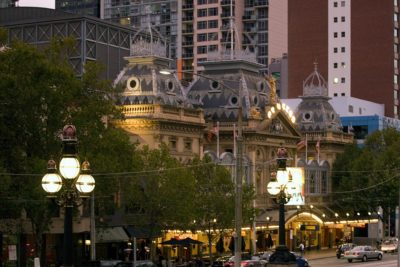For the night, I am a devil and will soon take a soul down with me to hell.
The deep pounding in my heart; I saw it and felt it vibrating inside the walls and throughout the floors of the theatre, like the world and I were alive with anticipation. It was in my veins and in my blood, beating like an army of drums. It was almost the start of the final act, my final act, as the demon Mephistopheles.
It was the new height of my career, a comedic baritone now playing a major role in an opera as solemn as Faust; the story of Dr. Faustus, who had sold his soul to the devil for youth and earthly pleasures. Night after night I was giving my all to the devil of Faust, sacrificing myself a little each time I sung his lines.
‘Federici, do you have my keys?’ a hushed Musgrove came to check on me. He meant the keys that were for the gaol in the scene I was about to enter.
‘Yes, I have them,’ I replied to the proprietor with my usual smile, tapping my side.
I came onto the stage in theatrical medieval attire, crowned by a hood of hell red. My cap, shoes and beard were pointed like pitchforks and a scarlet cloak swished behind me as I walked.
It was the end of the opening night, and encased by the golden walls of Melbourne’s Princess Theatre, each seat of the audience was filled. The orchestra welcomed me with a somber tone, and at the conductor’s notice, I was to start my final tune.
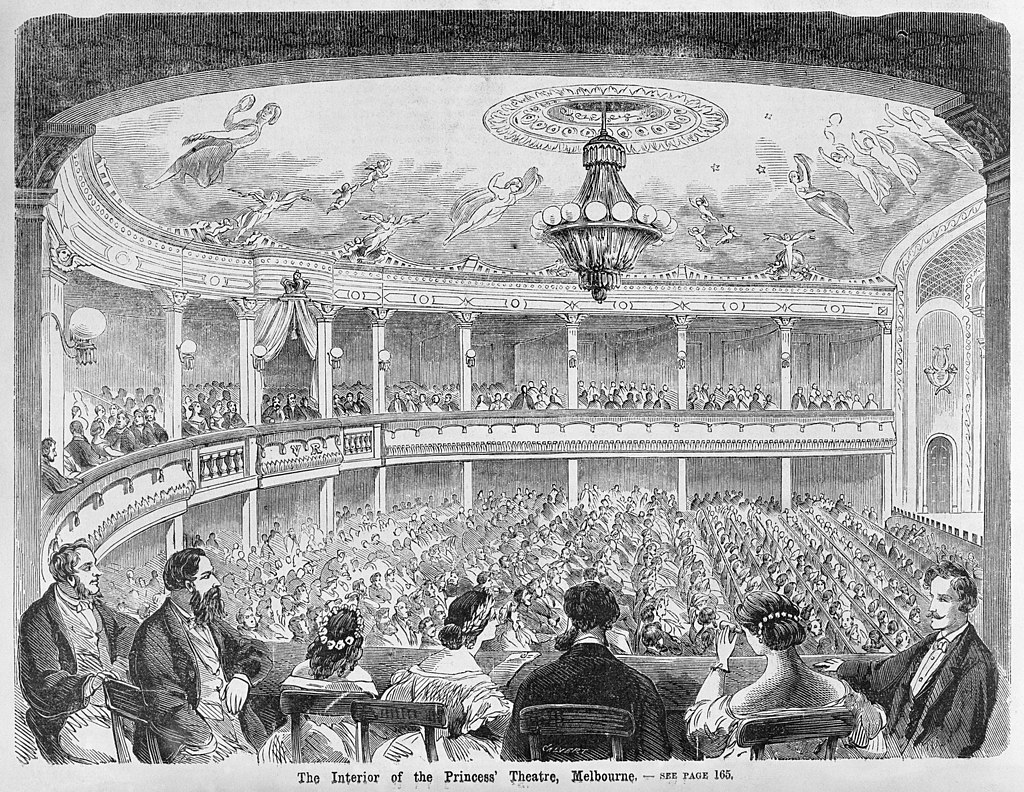
Audio- “Le Veau D’or” (The Golden Calf), performed by Feodor Chaliapin as Mephistopheles (1915).
All eyes were upon me, I hadn’t expected for the theatre to be so crowded. Critics watched me stern-faced amongst them, and how they frowned and their gazes burned. As I stood before them, the room was swaying underneath my feet like the deck of a rocking ship; but yet I knew nothing swayed with it, not the audience, nor the diamond chandelier.
Conducting the music ensemble, Mr. Cellier looked at me with a serious side glance; but why the look I pondered… Oh God! I missed my cue!
I burst into operatic song, singing harder than I have ever sung before. I could not afford such a mistake after getting this fair without as much as a blemish. But I caught up from my stutter, and I gave a high performance to remember. I watched the viewers look at me in awe before my eyes faded them to mist. Mephistopheles and I were joined in voice and character, in a world uninterrupted by anything but the performance. We sung until I could hear a choir of angels, angels that sung to me and damned Mephistopheles and Dr. Faustus to hell.
Now, forsaken by heaven; things were falling to silence, and I spoke my last words; “it might be”, quoted I. The red lights befell us, and I wrapped my crimson cloak around the kneeling Dr. Faustus with a tight grip on his shoulder. As the flames and heat of hell surrounded we descended into the infernal realm.
The pounding of the room became louder, and I could see the echoes of each pound as well as feel it. My throat and lips were as dry as a volcanic rock, and each breath entered my lungs with the searing heat of a fiery hearth. My heart- it stopped- and plummeted like a rock. My hand loosened on Leumane’s shoulder as we descended deeper and deeper into the tongues of scarlet flames and the black smoke that devoured us.
NO! I tried to cry with dry words, grabbing onto the stage’s floorboards above but I kept sinking into the darkness. And then I fell, into the black void.
Oh, how I had ailed day and night for this moment and now it came. The audience applauded as we bowed, I stood beside Stewart, and Leumane beside her, and we exchanged hearty glances as the theatre roared with admiration. I held my arms out to the crowd, out to my world, and if the theatre is my world, then tonight the world is my oyster! And here I shall remain until the end of time.
And so it might be.
As they climbed down from the stage; the cast of Faust were startled to find that no one was there to congratulate them. A crowd of people rushed past, including that of Federici’s wife, and they were headed into the green room.
On a mattress and cushions there lay Federici stretched out and motionless, with his crimson hood pulled down and his cap and shoes thrown beside him. Every person of the production watched intently as a sweating Dr. Wilmott pressed the metallic surfaces of a galvanic battery against Federici’s chest.
‘Increase the shock,’ the doctor commanded his assistant through crooked breaths.
Again, the doctor electrified Federici, and the body lunged forward. Nothing.
Dr. Willmott was quiet as he checked Federici’s pulse, and there was a hopeless darkness in his eyes as he put the batteries aside. ‘I’m sorry,’ Willmott said. It had been several minutes, and it was no use.
Federici’s fellow castmembers watched as the dead man was surrounded by grieving loved ones, still adorned in a hellish costume in a sight so peculiar to behold. All those who had just come down from the stage had the same squirming thought on their mind; but they did not dare to speak, nor could manage through their sorrow. Instead the castmembers exchanged silent and knowing glances between one another. What had happened, it was stranger than fiction, just like they say.
Had Federici not just been with them, taking his bows, a few minutes before?
The True Story of Federici: Ghost of the Princess Theatre
On March 3rd1888, Frederick Baker, also known as Federici, died after a fatal heart attack while descending into “hell” during the opening night of Gounod’s Faust at Melbourne’s Princess Theatre.
It is said that his ghost has haunted the premises ever since.
An Italian-born British opera singer, Federici toured internationally with respectable success before being summoned to Australia in June 1887, to perform with Messrs. Williamson, Garner and Musgrove’s Opera Company. Most of Federici’s work was as comedic roles in a variety of comic operas, but he was to enter into greater stardom with the admirable role as the devil in Faust.
Being the devil
To some readers, the name “Faust” wouldn’t have been new. Regardless of whether Faust did or did not sell his soul to the devil, his story has been told throughout many novels, plays, artworks, films, and songs since his first appearance in the 1500s. Faust’s likeness is believed to have been taken from a real Faust, whose reputation of being wicked now precedes him.
When Gounod‘s French opera came out in 1859, it followed a very similar narrative to the Faust story we’re all used to. The elderly scholar Faust, or Dr. Faustus, sells his soul to the devil and in exchange the demon Mephistopheles will serve him until Faustus is taken to hell.
With the aid of Mephistopheles; Faustus then seduces and impregnates the virgin Marguerite, and thus abandons her. Later, Marguerite is imprisoned under death row for killing her child, and Mephistopheles helps Faustus enter Marguerite’s jail cell. But when Faustus offers to save Marguerite from hanging, she refuses him and prays to God and his angels. Angels hear her plea and come down and rescue Marguerite, but Faustus and Mephistopheles can only watch her go as the angels damn them to hell.
Enlarge
/lossy-page1-800px-Stereokort_Faust_11_Marguerite_repousse_le_demon_-_SMV_-_S35b.tif.jpg)
Tragedy at the Princess Theatre
It was two days later; on a Monday morning, that the news hit the streets of Melbourne. Frederick Baker, the baritone who had performed in Faust on Saturday night, died just after fading from the audience’s view; The Argus announced.
“SHOCKING OCCURANCE AT THE PRINCESS THEATRE. TRAGIC DEATH OF MR. FEDERICI”, read the newspaper.
The tragedy occured just after Federici made his way onto the trap with Leumane (Faust), kneeling beside him.
The trap in question was a Corsican trap, 12 inches by 30 inches, and had a slow and even vertical descent into the stage.
It was while the trap was still in motion that Federici suddenly collapsed onto Leumane, and they both plummeted two or three feet below stage. Leumane was able to get up unaided, but it was clear that Federici on the other hand, was in distress. Leumane was sent to his dressing room while Federici was carried by workmen to the greenroom, where Federici was shortly attended to by his personal physcian Dr. Willmott. Dr. Willmott tried his best to revive Federici, but to no avail, and Federici was declared dead from a stroke.
The news broke like a comet shattering into the ground and throwing ripples through the earth; since all who had attended Saturday night’s performance clearly remembered Federici taking his bows at the end of the opera.
And then suddenly; the story got even stranger. The Illustrated Australian News reported that during Federici’s furneral;
The Rev. J. H. Goodwin, chaplain of the cemetery, attended for the purpose of reading the burial service, but just as the coffin, was being lowered
he was seized with a fainting fit, and had to be carried away.
Federici’s body was laid to rest in Melbourne’s General Cemetery, but it is said that his soul did not rest with it.
Enlarge
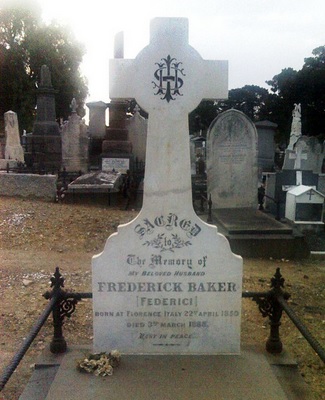
The Phantom of the Theatre
(1)The Princess Theatre at dusk, Melbourne (2013). From Wikimedia Commons. (2) Stained glass windows at the Princess Theatre (2009). From Wikimedia Commons.
Federici is known to often change seats during a performance, in order to observe the faces of the critics. He will also frown and brush his hair back if he considers an actor to be unskilled. Performer’s and make-up artists have also spotted Federici in the dressing room, wearing full theatre costume and staring at the stage as if he is ready to perform.
Even after the turn of two centuries, the Princess Theatre still hosts productions today, and tales continue of Federici watching the performances. Perhaps one night you may want to visit the theatre, to see these peculiar occurences for yourself?
Tales of Terror: Haunting of the Princess Theatre is a short ghost story by Tenzin Marius, based on the reported ghost sightings of Frederick Baker. This retelling belongs to its author and is protected by Australian Copyright laws, and will not be copied or reproduced without the permission of Tenzin Marius.
Research sources:
Bartlett, S. (2014). Princess Theatre. In S. Bartlett, Supernatural: the world guide to mysterious places. Sydney: Australian Geographic .
City of Melbourne Website. (2016, April 15). Ghost stories from Melbourne’s Princess Theatre. Retrieved from https://whatsonblog.melbourne.vic.gov.au/ghost-stories-from-melbournes-princess-theatre/
Marriner Group. (n.d.). PRINCESS THEATRE VENUE INFORMATION. Retrieved from Marriner Group: https://marrinergroup.com.au/venues/princess-theatre
Matthews, S. (2017, March 7). Federici’s ghost. Retrieved from State Library Victoria: https://blogs.slv.vic.gov.au/such-was-life/federicis-ghost/
The Argus. (1888). SHOCKING OCCURRENCE AT THE PRINCESS THEATRE. 8.
The Editors of Encyclopedia Britannica . (n.d.). Faust (literary character). Retrieved from Britannica: https://www.britannica.com/topic/Faust-literary-character
The Editors of Encyclopedia Britannica. (n.d.). Faust. Retrieved from Britannica: https://www.britannica.com/topic/Faust-literary-character
The Editors of Encyclopedia Britannica. (n.d.). Mephistopheles. Retrieved from Britannica: https://www.britannica.com/topic/Mephistopheles
the Illustrated Australian News. (1888). DEATH ON THE STAGE OF F. FEDERICI. 2.
the Press. (1888). PRODUCTION OF “FAUST” IN MELBOURNE. 3.
